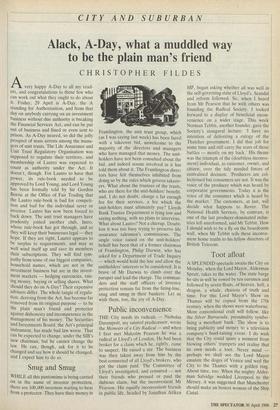Public inconvenience
THE City needs its radicals — Nicholas Davenport, my sainted predecessor, wrote the Memoirs of a City Radical — and when I first met Malcolm Pearson he was a radical at Lloyd's of London. He had been broker for a claim which he, rightly, came to suspect. He raised a stir. The business was then taken away from him by the best-connected of all Lloyd's brokers, who got the claim paid. The Committee of Lloyd's investigated, and censured — not their friends who pressed or paid the dubious claim, but the inconvenient Mr Pearson. His equally inconvenient friends in public life, headed by Jonathan Aitken
MP, began asking whether all was well in the self-governing state of Lloyd's. Scandal and reform followed. So, when I heard from Mr Pearson that he with others was founding the Radical Society, I looked forward to a display of beneficial incon- venience on a wider stage. This week Norman Tebbit, another founder, gave the Society's inaugural lecture: 'I have no intention of delivering a eulogy of the Thatcher government. I did that job for some time and still carry the scars of those battles — mostly on my back.' His theme was the triumph of the (doubtless inconve- nient) individual, as customer, owner, and citizen, over the tidy minded forces of centralised decision: 'Producers are col- lectivised but consumers are not. It was the voice of the producer which was heard by corporatist governments. Today it is the voice of the consumer which is heard by the market.' The customers, at last, will decide what happens to Rover. The National Health Services, by contrast, is one of the last producer-dominated indus- tries left unreformed, said Mr Tebbit. How I should wish to be a fly on the boardroom wall, when Mr Tebbit tells these inconve- nient home truths to his fellow directors of British Telecom.


























































 Previous page
Previous page